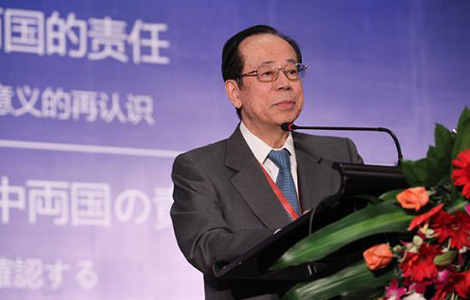Media giant comes of age
Updated: 2013-10-29 01:00
By Zhou Wenting and He Wei in Shanghai (China Daily)
|
|||||||||||
Shanghai group seals deal with online search leader to adapt in Internet era
The two main press groups in Shanghai are merging and will cooperate with online search engine Baidu to launch the Shanghai channel of Baidu News.
"The Shanghai channel of Baidu News will integrate the superiority of the rich news resources from Shanghai United Media Group and the powerful technologies and platform of Baidu to create a watchtower for Internet users to look into this international metropolis," said Zhu Guang, deputy president of Baidu.
Shanghai United Media Group, unveiled on Monday, was formed with the merger of Jiefang Daily Group and Wenhui-Xinmin United Press Group.
Qiu Xin, president of the new group, said it will work with Baidu to build the channel into "the first choice for searching in Shanghai".
"It can be a win-win relationship between old and new media instead of a competing one," he said.
The channel will include employees from both new and traditional media, and will open soon.
Shanghai United Media Group is now one of China's largest press groups, with estimated assets of 20.8 billion yuan ($3.4 billion) after the consolidation.
Wenhui-Xinmin United Press Group owns 16 newspapers and journals, including Xinmin Evening News, the first evening newspaper on the Chinese mainland, which started publishing in 1929, as well as a dozen new media products.
Jiefang Daily Group owns 14 newspapers and journals, including Jiefang Daily, which was launched in 1941, and was once the official newspaper of the Central Committee of the Communist Party of China.
Jiefang Daily, Wenhui Daily and Xinmin Evening News will become independent legal entities to "focus on the quality-oriented reform of competitive newspapers", according to Qiu.
Qiu declined to say whether some of the newspapers will be closed, but said the group is researching the types and number of newspapers the Shanghai market can accommodate.
Rupert Murdoch, the media magnate who serves as News Corp chairman and oversees more than 100 media outlets worldwide, has predicted there may be no newspapers in 10 years' time owing to competition from the digital world.
Examples included heavyweights such as The Financial Times in the United Kingdom, which has ceased circulating printed German versions, and the Washington Post in the United States, which ended up in a somewhat surprising sellout to Amazon founder Jeff Bezos.
Even though some publishers are moving quickly to identify and invest in alternative revenue models, print media for the most part remains dangerously dependent on traditional advertising revenues that are eroding at a dramatic rate, said Ye Jun, partner at Roland Berger Strategy Consultants.
The market share of advertising revenue in newspapers in China has dropped to 10.4 percent in 2013 from 22.9 percent a decade ago, while the figure for the Internet soared from merely 1.5 percent to 24.5 percent during the same time span, according to media investment consultancy GroupM.
If "print is dying", as people have been saying for years, why not let a tech mogul try to give it a digital resuscitation, said Jin Qing, an analyst on new media studies with IT consultancy Analysys International.
"Jiefang and Wenhui-Xinmin groups have long sensed the urgency to go online and go mobile, since they have previously launched their respective news apps. This merger indicates an accelerated process to embrace the digital channels," Jin said.
As content is increasingly delivered in digital format, the collaboration with Baidu offers tools to reverse the fortunes of daily newspapers, said Ye.
The merger may benefit the media group financially by reconstructing assets and resources, according to Zhang Zhi'an, vice-dean of the School of Communication and Design at Sun Yat-sen University in Guangzhou.
"Stocks and properties held by the two groups can now be more effectively allocated to invest in the new media territory," said Zhang.
But a genuine combination should go beyond simply moving news online, and instead integrate and use Internet resources to generate more insightful content, Ye noted.
According to Jin, as new entrants vie to seize opportunities, newspapers should preserve their most original content, such as investigative pieces or opinion articles, in print form.
A further concern is talent shortage, Ye said, as many high-caliber journalists have turned to Internet companies or new media groups.
Dennis Pamlin, founder of Sweden-based 21st Century Frontiers, said the agreement is an example that Chinese news companies understand the rapidly moving media landscape.
"Search engines are one of the most important media tools today, but it is also a tool that is of significant importance for everyone to find their way around the Web," said Pamlin, whose organization tracks how Western media report on China.
"Hopefully this move will also help Baidu reach a more international market and contribute to vital discussions about the possible futures for search engines," said Pamlin.
Contact the writers at zhouwenting@chinadaily.com.cn and hewei@chinadaily.com.cn
Related Stories
Over 200 enterprises register in Shanghai FTZ 2013-10-28 20:48
Cross-Strait forum proposes Shanghai FTZ co-op 2013-10-28 14:54
Co-op between Taiwan and Shanghai FTZ proposed 2013-10-28 09:30
Twin machinery fairs power up in Shanghai 2013-10-28 07:02
Today's Top News
Storm wrecks havoc in S Britain, leaving 4 dead
'Prime time' for Chinese firms to invest in EU
China providing space training
Antiquated ideas source of Abe strategy
Women's congress aims to close gap
Accident in Tian'anmen kills 5
Media giant comes of age
Miscommunication source of conflicts
Hot Topics
Lunar probe , China growth forecasts, Emission rules get tougher, China seen through 'colored lens', International board,
Editor's Picks

|

|

|

|

|

|





